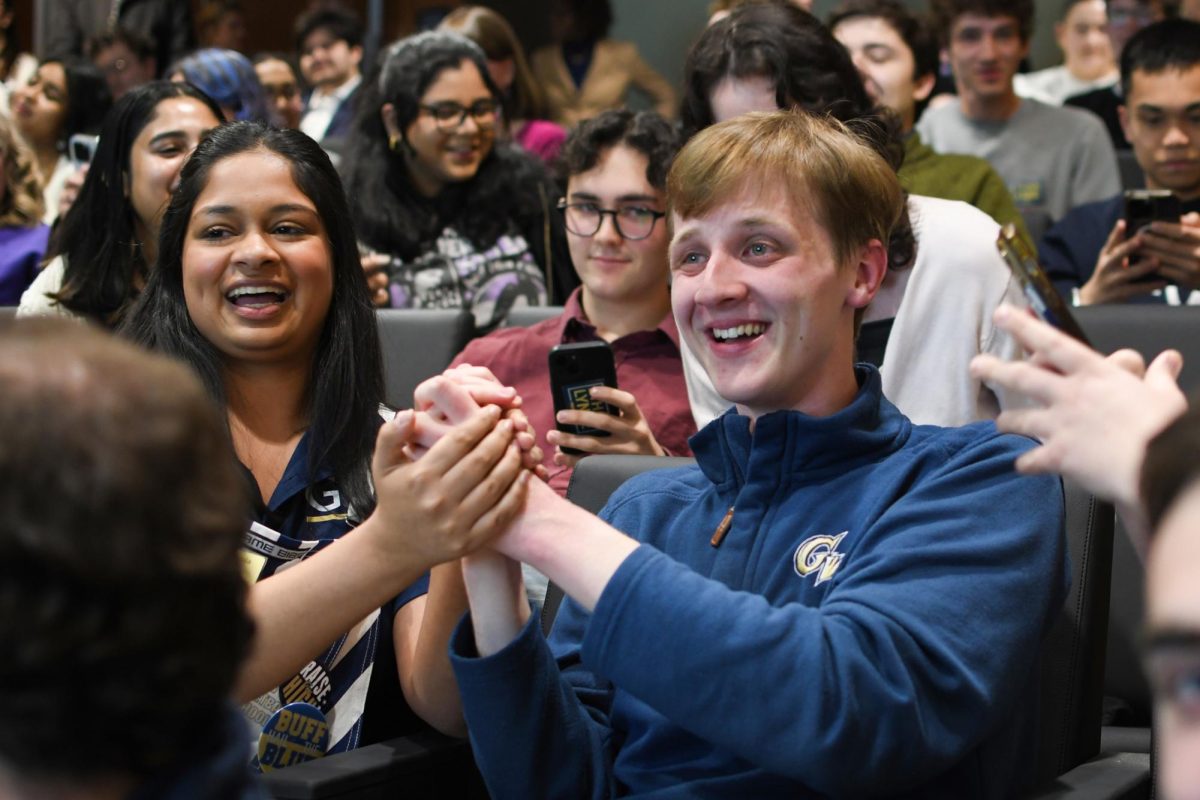Candidates for the top Student Association executive spots have vowed to achieve many objectives if elected to office, including expanding access to mental health resources and creating online textbook banks.
But not all initiatives proposed by candidates are centered around facts. The Hatchet scanned each candidate’s platform to note misleading or inaccurate information to give the GW community additional context about each candidate’s platforms.
Candidates for president
Christian Zidouemba
Zidouemba, a sophomore, said he will push for administrators to give students unlimited free access to the Metro through WMATA’s U-Pass program.
Check:
Officials have refused to implement a U-Pass program even as students have advocated for the program for several years. Nearly 75 percent of students voted to approve the pass in 2016.
Officials said in 2016 that if implemented, the pass would be paid for by a $250 fee added on to students’ cost of attendance, which they said is not “feasible or fair.” Officials and students have discussed an “opt-in” option, so only interested students would need to pay the additional fee, but WMATA officials said that option would make the program unprofitable for the Metro.
In light of the COVID-19 pandemic, WMATA also suspended the U-Pass program overall until further notice.
Hannah Edwards
Edwards, a junior and the former SA vice president for diversity and inclusion, said she wants to implement a “no-cost, short-term” mental health program through the Colonial Health Center’s Counseling and Psychological Services.
Check:
Students can access free individual and group counseling through the CHC CAPS program. Students can contact CAPS free of charge to speak with a therapist at any time without an appointment during the spring semester by calling 202-994-5300.
Other CAPS services, like psychological assessments, can cost up to $900 if the student is not enrolled on the Aetna Student Health Insurance Plan, according to the CHC website.
Charles Aborisade
Aborisade, a junior and U-at-Large senator, said he will collaborate with GW Libraries to create a “Textbook Pantry” for students to request free or lower cost introductory textbooks.
Check:
Following SA advocacy, the GW Library has a “Top Textbooks” program that allows students to request textbooks to check out for free from the library. During the virtual learning period, the library suspended the full program to check out physical textbooks, but most of the textbooks available through the program can be found online.
Brandon Hill
Hill, a junior and the current president of the SA, said he will “ensure” that 100 percent of the SA budget will go toward students.
Check:
There is nothing factually inaccurate about Hill’s proposal, but it does lack some context. Undergraduate and graduate students are charged with a $3 per credit hour fee to a maximum of $45 that goes toward the SA budget. The SA finance committee then allocates SA fees that accumulate to more than $1.5 million to more than 500 student organizations.
The SA fee has slowly increased in recent years to accommodate the rising number of student organizations and their operations on campus.
Candidates for vice president
Kate Carpenter
Carpenter, a sophomore and U-at-Large senator, said she aims to partner with “popular” transportation companies like Capital Bikeshare to increase students’ access and pricing options to use them.
Check:
In 2019, the District Department of Transportation announced that students can receive a discounted Capital Bikeshare annual pass. Originally, the annual passes cost $85, but students are eligible to purchase a pass for $25. GW’s enrollment in the program allows students to be eligible to purchase the discounted passes.
Sofia Packer
Packer, a junior and CCAS-U senator, has called on officials to prioritize housing for the fall semester and virtual learning periods for those who need it if they do not have a safe, alternative place to live.
Check:
Undergraduates facing “extenuating” circumstances were eligible to apply for on-campus housing for the 2020-2021 academic year. Officials granted on-campus housing to about 500 students in the fall who did not have a “safe” and “alternative” place to live.
Officials expanded housing in the spring to host an additional 1,500 students on campus, but only 1,100 students applied for housing.
About 1,000 additional students moved into District and Potomac houses and Shenkman, South and Francis Scott Key halls this semester. Each student living on campus has their own bedroom and shares a bathroom with no more than one other student due to COVID-19 protocols.








